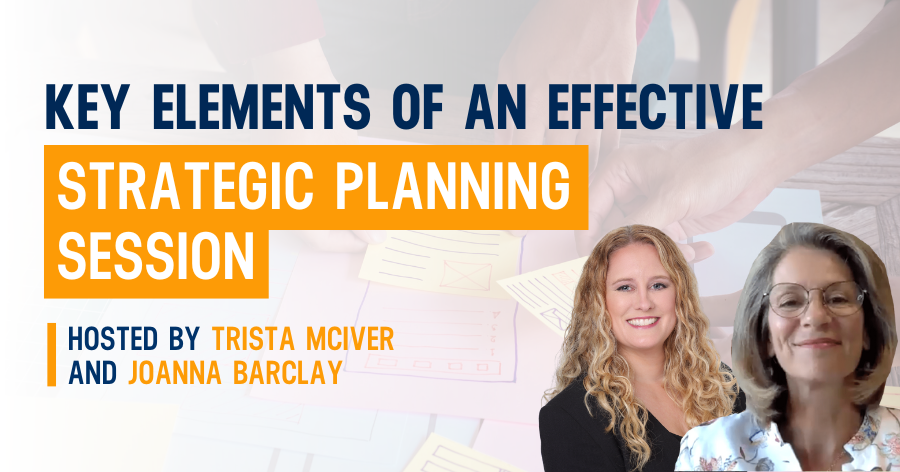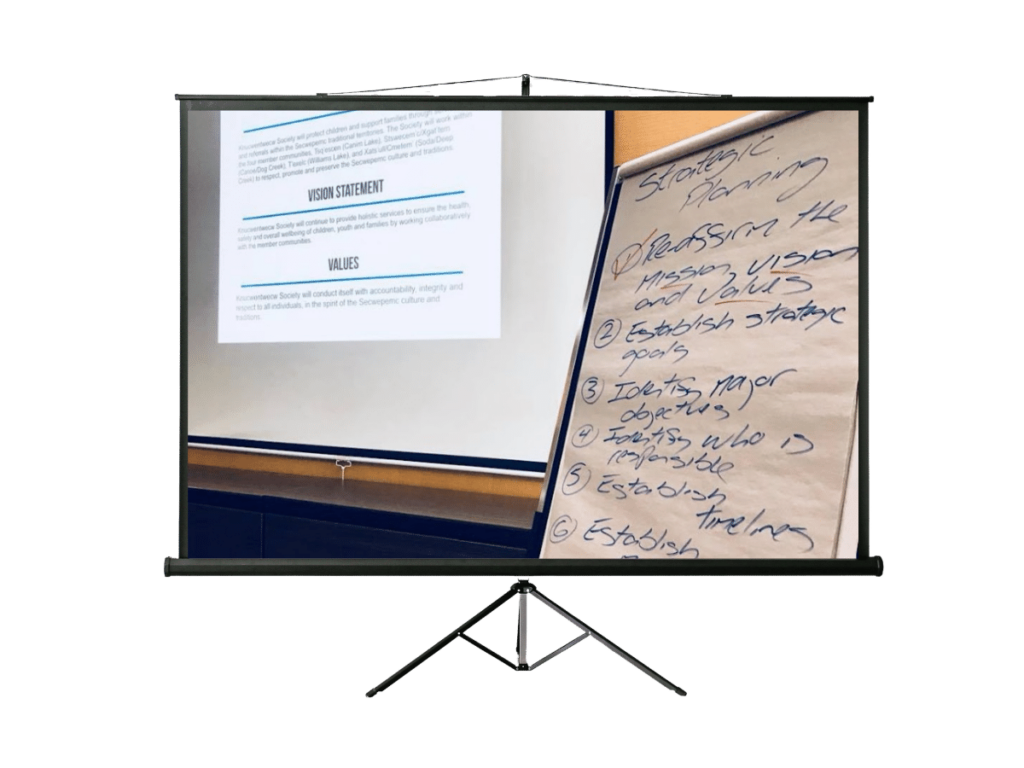
In this episode of the Strategic Non-Profit podcast, join Trista McIver and Joanna Barclay to discuss the key elements that encompass effective strategic planning sessions for Non- Profit Organizations.
The Importance Of Strategic Planning
An organization must carry out Strategic Planning to understand their future and how they intend on reaching specific goals to get there. There are three main aspects to consider when Strategic Planning that you should be aware of:
- People. When you bring diverse people together; it creates commitment, excitement, and inspiration because people’s voices, opinions and ideas are heard.
- Process. The methodology that Joanna uses is called the technology of participation. This process brings together a diverse group of people and Key stakeholders for the organization.
- Product. What you create is compelling for an organization.
Also read: Nonprofit Strategic Planning: The Planning Process
How Often Should You Do Strategic Planning?
Strategic planning sessions ideally should be held every year, but some nonprofits conduct them every three-five years, depending on your industry and how much change occurs. Typically, an organization’s mission, purpose, products, or services won’t change, so it’s suggested that you use a strategic plan when beginning a transition phase or even onboarding new members.
Sometimes the board governance dictates when strategic planning or how often it needs to be done. So it depends on what’s happening within the organization and the yearly cycle, So typically people do at the beginning of a year. If, especially if they’re in sales and they have to, come up with new plans and new strategies for what’s happening in their organization.
A full planning session should probably be undertaken every three years. Still, your strategic plan really should be visited every six months to 12 months because that’s when the action plan needs to be reviewed – it’s not something you’d be once and put on a shelf, and it collects dust.
Key Elements To Strategic Planning Sessions
Creating An Action Plan
Planning processes require you to get together with a group of people and think strategically about what will happen with that company, considering its mission, mandate and purpose with the services and clients you already have.
Ask yourself and your team, “where do you want to be in three years?” to help create mutual hopes and dreams as an organizational unit. Also, by asking the leadership team questions such as:
Identifying Strategic Structures
Tactical Planning
Your goals foremost have to be specific, measurable and attainable. Furthermore, they need to be realistic and timely. What’s that catalytic, measurable accomplishment that you want to work towards, that you will be able to measure at the end of the year. It is operational, but it’s strategic at the same time because it’s helping you move towards your mission or your vision that you have set for the organization.
I did a strategic plan for an organization and what really made them successful was culture.
Joanna Barclay
Operational Planning
An aspect of every board meeting should be delegating time to analysing your strategic plan, for Joanna she endevors to embed this into every board meeting since Strategic Interactions arise throughout the year. Joanna’s board agenda is structured with strategic agenda items first and operational items afterwards. After that they then need board perspectives.
Also read:
- 18 Popular Nonprofit Strategic Planning Models & Tools
- Choosing A Nonprofit Strategic Planning Facilitator: A Step-By-Step Guide
Building Strong Relationships
An often overlooked aspect of a strategic planning process is building relationships with other professionals as you explore workshops and have dialogue sessions. You’re getting to know who your colleagues are and how they think, a key element of sustaining you, especially when problems arise when you’re implementing ideas – because nothing ever goes perfectly.
You’re always going to have challenges, so logically the higher the quality of the relationships you have, the better they will support you in your times of difficulty.
Delegating Responsibility
The CEO and senior management team are responsible for whatever is happening within the action plan. For instance, if your team produces multiple potential different strategies on how you’re going to achieve your vision – You’re not going to qork on all seven at the same time!
So typically, you’ll choose three or four and we’ll do an action plan. For instance, for that strategy, what do we want to achieve? Let’s say it’s a 12-month action plan. If we’re going to work on this strategy for a year, we want to identify what’s the measurable accomplishment.
Final Thoughts
If you have any questions or need help with strategic planning, Nonprofit Board Governance, bylaw reviews, or running effective board meetings, please reach out to Trista McIver at success(a)amcnposolutions.com or th
Create a brighter future for your organization with AMC
AMC’s skilled strategic planning facilitators can help you navigate complex issues and build the transformative plan you need for success.
Whether you have a specific goal, troublesome problem or a new exciting opportunity you need assistance navigating -AMC’s customized strategic planning sessions will help.
Contact us today to learn how AMC’s Strategic Planning facilitators can help your organization develop, improve, and grow.



